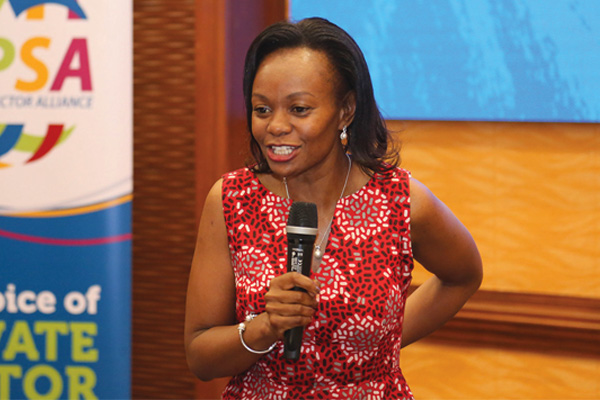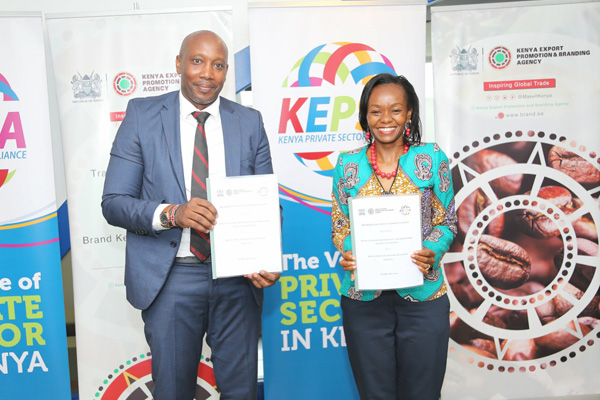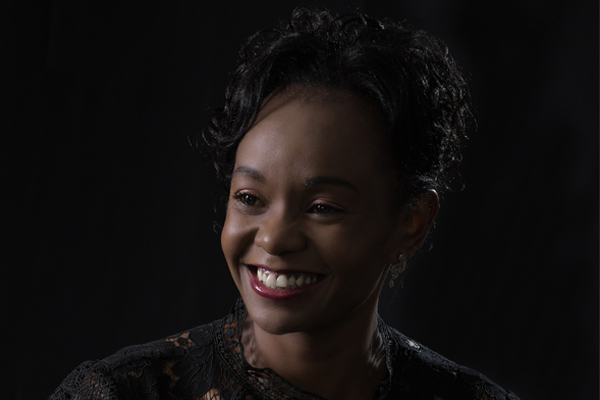#4
Carole Kariuki-Karuga
CEO KENYA PRIVATE SECTOR ALLIANCE (KEPSA)
A ring-side member of a flamboyant coterie of witty, young and very learned women CEOs of multi-national corporations (MNCs), global brands, international institutions, civil societies and business lobby organisations in Kenya that includes Phyllis Wakiaga, Lina Githuka, Angela Ndambuki, Kendi Ntwiga, Agnes Gathaiya, and Caroline Mukiira, to name but a few, Carole Kariuki Karuga has organically grown into one of Kenyans most dependable leader in the business space.
Calm and withdrawn when she first took over the helm as CEO of the Kenya Private Sector Alliance (KEPSA), Carole has matured with time and exposure to become the most mature, dependent, informed and organised business leader in Kenya, objectively loyal to her country, to a fault.
She has transformed an initially elitist and ego-centric big business lobby group to one that is now attracting the likes of micro and start-up businesses, as misplaced as these businesses are. From an organization of business lobby associations, it is not uncommon to get individual members of KEPSA, both small and large.
Carole Karuga’s frequent presence on NTV, KTN and Citizen TV early morning and late evening shows, have only served to endear her as an informed and most articulate panellist. Participation in local and global webinars deliberating on practically all aspects of policy formulation and project management and interventions help to propel her for a steep national leadership ascent.
For the rest of 2021 and early 2022, Carole leads KEPSA with the mantra, ‘Emerging economically stronger together: Living with Covid-19 and the new world order’.
The Kenya Private Sector Alliance (KEPSA) is the apex body of the private sector registered in 2003. It was formed to drive yearly economic development through facilitating improvements in the business sector, addressing cross-cutting business issues, driving investments, and addressing socio-economic issues with its partners. KEPSA brings together over 500,000 direct and indirect members organized through business associations, corporates, multinationals, small and medium enterprises (SMEs) and start-ups to speak in one voice, working closely with Government and other stakeholders through structured Public-Private Dialogue (PPD) platforms and other engagement mechanisms.
Since the outbreak of Covid-19, KEPSA has worked closely with the government and other partners to cushion Kenyans and businesses particularly SMEs against the adverse effects of the global Covid-19 pandemic.

KEPSA developed priority interventions to be pursued under KEPSA Economic Management Framework for Covid-19 Response, which were tabled and adopted by the government to ensure business continuity. The framework led by KEPSA CEO Carole Kariuki Karuga was determined to cushion the private sector against the impact of Covid-19 on the Kenyan Economy. In addition, KEPSA developed protocols adopted by government to enable business continue with their operations amidst the pandemic and enable the reopening of the economy.
KEPSA also set up a free toll call center 1196 that provided information to the public and private sector on covid-19 response initiatives as well as providing a platform through the ‘Wheels for Life’ program for expectant mothers to access free transport to a health facility during curfew hours and lockdown period.
In support of the health sector, KEPSA through its Health Sector Board-Kenya Healthcare Federation donated Personal Protective Equipment worth millions of shillings to a number of counties including Kajiado, Mombasa and Machakos as it continues to seek ways of expanding this initiative to other counties.
- Public-Private Dialogue (PPD) Pillar:
• Global Competitiveness Index
• Doing Business Index - Sustainability Pillar:
• Sustainable Development Goals (SDGs)
• Green Economy
• Blue Economy
• Climate Change - Governance Pillar:
• Corporate Governance
• National Leadership
• Corruption - Business Hub Pillar:
• SME Development
• Economic Diplomacy - Social Pillar:
• Jobs and Enterprise Development for Youth and Women.
Trade Mark East Africa (TMEA) is one of the main partners working with KEPSA to drive the Public-Private Dialogue Pillar.
The first pillar aims to promote sustainable and inclusive economic growth, strengthen economic foundations locally, regionally and globally, support business-friendly policy laws at National and County Levels and strengthen firm-level productive capacities and value chains in growth centres: agriculture, light manufacturing and tourism. All these objectives are focused on improving Kenya’s ranking in global competitiveness and ease of doing business indexes with their indicators incorporated and monitored in PPD engagement matrices.
So far, KEPSA has successfully partnered with EU-Africa RISE Program to launch a Business Competitiveness Centre and develop a national competitiveness strategy to guide the centre. The association also facilitated Tanzania-Kenya business forum to address trade barriers affecting business in the region which was led by the two Presidents; the 7th Tax Round Table with Kenya Revenue Authority Commissioner General aimed at resolving tax administrative challenges as well as holding five Ministerial Stakeholder Forums focusing on energy, petroleum and mining, public finance, health and transport and infrastructure.

The second pillar on Sustainability aims to: accelerate transition to a green economy by strengthening cooperation between private and public sectors, develop the capacity of the private sector to incorporate sustainability practices into their strategic plans and company initiatives, transition Sustainable Inclusive Business-K program into KEPSA’s Knowledge Centre to champion for the adoption of green and blue economy principles, climate change and sustainability in the private sector, create linkages between academia and private sector on green growth, adaptation and mitigation to climate change and achievement of sustainable development goals, enhance financing of green projects, promote implementation and compliance to existing policies, action plans and laws on green economy, SDGs and climate change and finally to promote trade and investments in the blue economy sector.
To implement this second pillar, KEPSA effected staff and members training on sustainability principles, circular economy and climate change adaptation and mitigation and partnered with Global Compact in adopting effective usage of Action Manager tool that tracks implementation of SDGs in organizations.
The Environment, Water and Natural Resources Sector Board and SIB-K team are working with the Ministry of Environment and Forestry to develop a communication plan for Extended Producer Responsibility Regulation (EPR) Sensitization project. KEPSA is the co-chair of Kenya Partnering for Green Growth and the Global Goals 2030 (P4G) platform wherein it has been instrumental in transformative change and innovation to deliver sustainable development.
Third, is the Governance Pillar whose objective is to influence Kenyans to aspire to a better future and to strive for a great Kenya, curb corruption in the private sector and change the country’s narrative to a positive narrative focusing on the four key areas of leadership, public safety, global competitiveness, and blockchain integration into government systems. So far, KEPSA managed to secure a donation from Danish International Development Agency after the 2019 Anti-Corruption Conference.
KEPSA held a governance action meeting in April 2021 which provided an opportunity to engage other players and experts in the field of Governance in Kenya and beyond, for purposes of learning and borrowing from their best practices. KEPSA signed an MoU with the Blue Company that will see them use the association as a platform to create awareness around the fight against corruption and all its forms within the private sector.
The Business Hub Pillar focuses on enhancing resilience and growth of SMEs for wealth and job creation, enhance MSME business recovery from Covid-19 impacts, influence policies and laws focused on promoting trade and investment, increase competitiveness and market access for SMEs business growth, increase exports regionally and globally and strengthen county economic blocs capacity to attract investments.
KEPSA has financed MSME loans amounting to over Ksh40Million to 101 businesses within the past year. Through a partnership with MasterCard Foundation Project, KEPSA provided virtual training and mentorship sessions to over 6,000 participants. These sessions are still ongoing; hence the number of participants keeps growing with each session.
KEPSA has partnered with Zydii Africa and Grassroots Business Fund to offer technical assistance through an online module to beneficiaries of the Mastercard Foundation Covid-19 Recovery and Resilience Loan Programme.
KEPSA also partnered with Bill and Melinda Gates Foundation to provide support and training on issues regarding Gender-Based Violence (GBV).
The fifth and final pillar, the Social Pillar, has as its primary focus, jobs and enterprise development for Youth and Women. This pillar seeks to promote youth employment and entrepreneurship for economic growth, champion women jobs enterprise development, promote gender inclusivity and its mainstreaming, and enhance access to finance and markets.
KEPSA is currently running several projects all aimed at providing the youth and women in Kenya with the skillset and funds to create their own business ventures. The Ajira Digital Project was started in 2016 by the Ministry of ICT, Innovations and Youth Affairs, which was funded by Rockefeller Foundation, with KEPSA as the implementing partner focusing on creating awareness and training on online work, with a component of SMEs and mentorship. Around 8000 young people benefitted from this intervention.
In 2019, the second phase of AJIRA was launched with funding from Mastercard Foundation under Young African Work Initiative with KEPSA and eMobilis as implementing partners with KEPSA focusing on job demand linkages both in private and public sectors. Since May 2020, the project under KEPSA has so far: linked about 20,000 youth to various jobs in the digital eco-system, over 2000 MSMEs have benefitted from the program enabling them to expand their markets and realigning their internal strategies through various digital solutions and also established over 30 partnerships with various digital platforms to promote outsourcing as core business strategy. The project has also worked with the public sector in supporting its digitization efforts and is currently working with the Judiciary in its digital reforms providing opportunities to about 1000 youth while addressing the ease of doing business through improving judicial efficiency. Efforts are also underway to support the development of a blueprint of how government can outsource work to digital platforms and freelancers in the country propelling the program’s vision of position Kenya as the leading Freelancing Hub in Africa.
The project has been implemented in various counties to promote youth employment and women enterprise development countrywide wherein 70% of the beneficiaries of this project are expected to be women.
To bring reforms to board diversity and inclusivity, KEPSA partnered with the Kenya Institute of Management (KIM), Nairobi Securities Exchange (NSE), and New Faces New Voices (NFNV) to undertake the 2020/2021 Board Diversity and Inclusion Survey, aimed at uncovering how diversity influences decision making, productivity, innovation, and overall performance in the workplace. The research findings will inform policy reforms on diversity and inclusivity in private and public sectors in Kenya.

KEPSA remains very active on various social media platforms like Twitter, YouTube, LinkedIn and Facebook, where its successes and calls to action are conveyed to those keen on the growth of the private sector and economic reform in Kenya.
While overseeing all these activities, Carole Kariuki Karuga maintains a busy event calendar, as she champions all private sector engagements where her expertise and immense knowledge are often called upon to promote the association’s agenda of private sector growth. Taking all this into account, KEPSA has taken a ring side seat in committees overseeing the distribution and management of the Covid-19 vaccines, to ensure that the process is onboarded and implemented as effectively and as efficiently as possible.
KEPSA serves as a federation of over 80 Associations and professional bodies-such as the Kenya Tourism Federation, Federation of Kenya Employers, Kenya Association of Manufacturers, National Federation of Jua Kali Associations, SME Founders Association, Micro and Small Enterprises Federation, Fintech, TESPOK, ASNET, Kenya Transporters Association, Kenya Security Industry Association, Kenya Media Association, Kenya Tea Growers Association, Kenya Flower Council, Kenya Bankers Association, Kenya Health Federation , American Chamber of Commerce , British Chamber of Commerce, Retail Traders Association , ICPAK, LSK among others, all with large and small business members across the country.
KEPSA also host the Kenya Chapter of the International Chamber of Commerce (ICC) as a member. The Kenya National Chamber of Commerce and Industry (KNCCI) is a member of the ICC.
KEPSA serves as the focal point of East Africa Business Council (EABC) whose board of directors is currently chaired by Nik Nesbitt. EABC is the apex body of businesses in EAC.
















